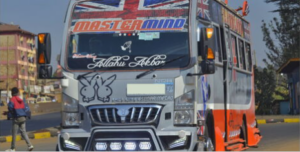![]()
On Friday, November 8, popular matatu SACCO Super Metro addressed a series of viral images circulating on social media that appeared to show one of their Public Service Vehicles with the popular ‘Murima’ graffiti.
The images, widely shared as a playful critique of the Kenya Kwanza government and President William Ruto, depicted a man chopping down a tree labeled ‘Murima.’ In another image, a man is shown on his knees, seemingly asking for forgiveness from a group portrayed as devout churchgoers.
Super Metro used its official social media platforms to clarify that the image of their matatu circulating online had been altered using Photoshop.
The term ‘Murima’ has gained popularity recently after it was introduced by former Deputy President Rigathi Gachagua. During a period of heightened political activity, Gachagua repeatedly referred to ‘Murima’ as a symbol for the people of Mount Kenya and warned leaders against alienating the voter base in this region.
Known for his candid approach, the former Deputy President frequently emphasized the importance of the Mount Kenya voter bloc while speaking in his home region, often regarded as his political stronghold.

Over time, the ‘Murima’ label has become a popular term among Kenyans, who now use graffiti and humorous imagery to reflect on the nation’s political climate—perhaps as a form of lighthearted resilience.
Following Super Metro’s statement denying the presence of the contentious graffiti on their vehicle, some witty Kenyans playfully accused the SACCO of fearing repercussions from the government.
With Rigathi Gachagua now impeached and Kithure Kindiki installed as Kenya’s new Deputy President, a sense of uncertainty has emerged regarding the identity of Mount Kenya’s new political figurehead.
At the funeral of businesswoman Lucy Wambui in Kiambaa, Kiambu County, earlier this week, Gachagua reflected on his impeachment and the response it stirred among his supporters.
“Many people are calling me, asking what will happen next. I tell them, don’t worry… Our community is unique, and many people were surprised. They thought we would be out in the streets, lighting fires, damaging vehicles, shouting—but that’s not us. They don’t understand us well. When we feel wronged, we stay silent,” Gachagua stated.
He also encouraged the people of Mount Kenya to express themselves through song and dance instead of public protests.
“Say nothing, and if you feel the need to express yourself, let it be through song and dance,” he added.